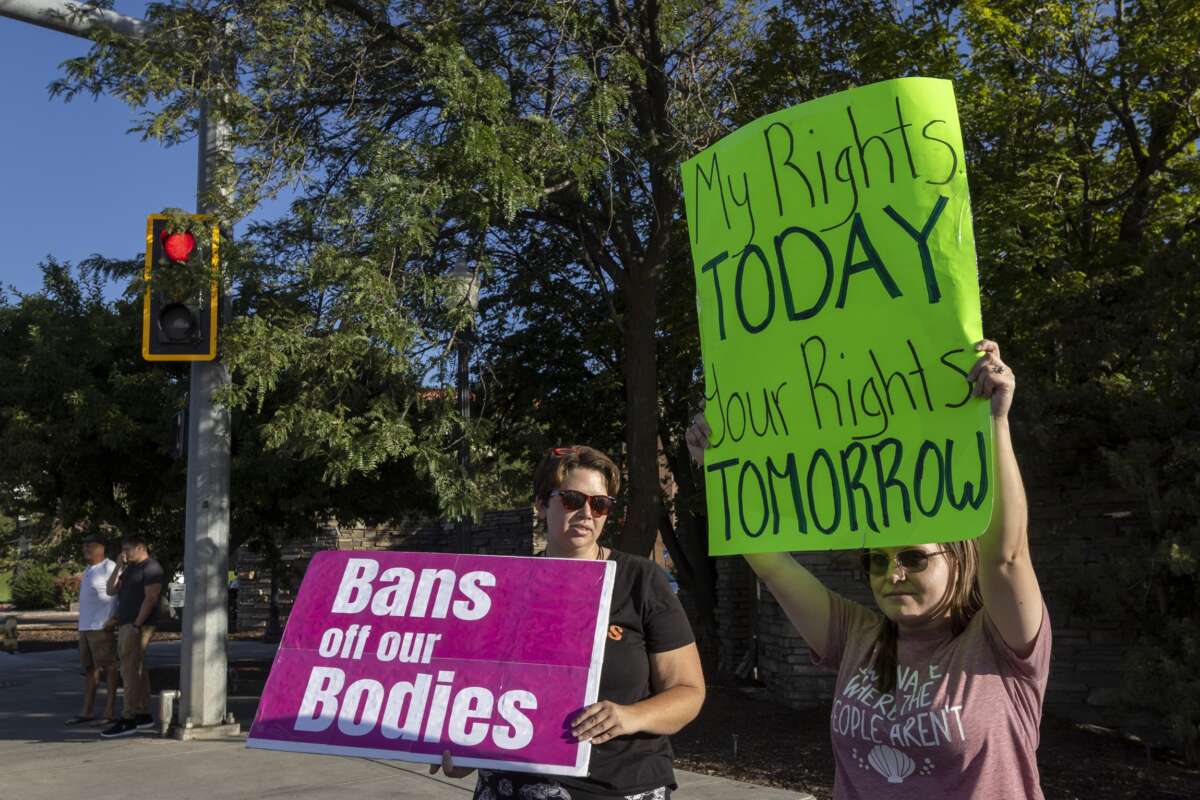Following Idaho lawmakers’ failure to revise the state’s abortion ban, a group of Idaho residents is exploring the possibility of putting a ballot initiative before voters to allow them to decide on abortion rights for themselves.
Idaho’s trigger ban on abortion was automatically implemented after the Supreme Court’s 2022 decision to overturn abortion rights protections across the country. The law bans abortion at every stage of pregnancy, with exceptions only in cases of rape or incest — which must be documented to law enforcement — or in cases where a person’s life is at risk due to their pregnancy.
Abortion providers in the state can be punished with a prison sentence of two to five years. They can also be sued for financial penalties by family members of the person who received the abortion.
After Idaho residents sued to get the law overturned, an appellate court placed an injunction on enforcing it. However, the U.S. Supreme Court temporarily lifted that injunction, and next week will decide whether it should be permanently lifted, pending the outcome of the case in the lower courts.
With the state legislature failing to take action, some residents in the state have formed an organization called Idahoans United for Women and Families in hopes of overturning the statute. The group is reportedly looking into the possibility of a petition drive to place an abortion rights ballot before voters — an action that many states’ residents elsewhere in the U.S. have done to successfully change abortion laws in their jurisdictions.
Unlike those states, however, Idaho’s resident-led ballot initiative only has the force of statutory law, not a constitutional amendment. This means that, even if the effort was successful, the state legislature could simply pass a new law if it disagreed with the terms of the ballot initiative.
Other issues abound for organizers of the pro-abortion proposal. With other abortion statutes still on the books in Idaho, it’s unclear whether an abortion initiative could, on its own, restore abortion rights to Idahoans. Rules on the ballot initiative also require it to be submitted 18 months prior to an upcoming election, meaning that the initiative might not appear before voters until 2026 at its earliest.
The state attorney general — currently anti-abortion Republican Raúl Labrador — also has to certify the language of any ballot initiative proposal before a signature drive can begin. That could create a legal situation similar to one in Florida, when that state’s attorney general attempted to block an abortion rights ballot proposal last year.
Still, the effort to start a ballot initiative, and its possibility of success, would demonstrate that abortion rights are popular even in one of the most conservative states in the nation.
Polling shows that most Idaho residents are unhappy with the current abortion law. According to a survey published earlier this year by Boise State University’s Idaho Policy Institute and School of Public Service, 58 percent of residents want the abortion law changed, while only 33 percent want it to remain intact. Of those who wanted to see the current law altered, voters were split on whether it should merely allow for additional exceptions (such as to protect the health of the pregnant person or in cases where pregnancies are non-viable) or allow abortion up to and/or beyond fetal viability (generally regarded as around 22-25 weeks of pregnancy).
Idahoans United for Women and Families members are optimistic that they could be successful in passing a law through the initiative process.
“In the absence of a remedy, we are moving full steam ahead,” said the group’s spokesperson Melanie Folwell.
Other members of the group say that organizing the ballot proposal will showcase that abortion rights are more popular in the state than some might perceive.
“The environment of it being very black and white — you’re either pro-life or pro-choice — I just think that’s a false narrative that we’ve been presented with for so long,” said Summer Jackman, a lifelong Idahoan and a board member of the group. “I hate that we can’t talk about it with more compassion, empathy, science and common sense without the fear of having it be one way or the other.”
Media that fights fascism
Truthout is funded almost entirely by readers — that’s why we can speak truth to power and cut against the mainstream narrative. But independent journalists at Truthout face mounting political repression under Trump.
We rely on your support to survive McCarthyist censorship. Please make a tax-deductible one-time or monthly donation.
